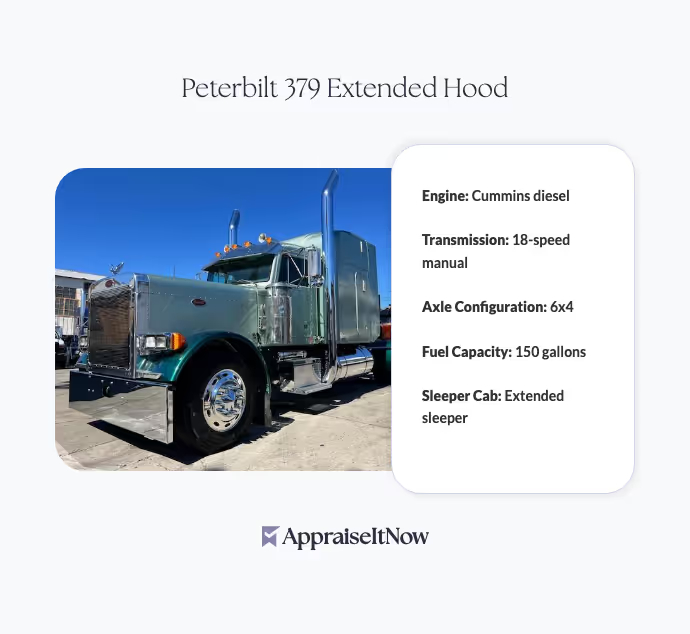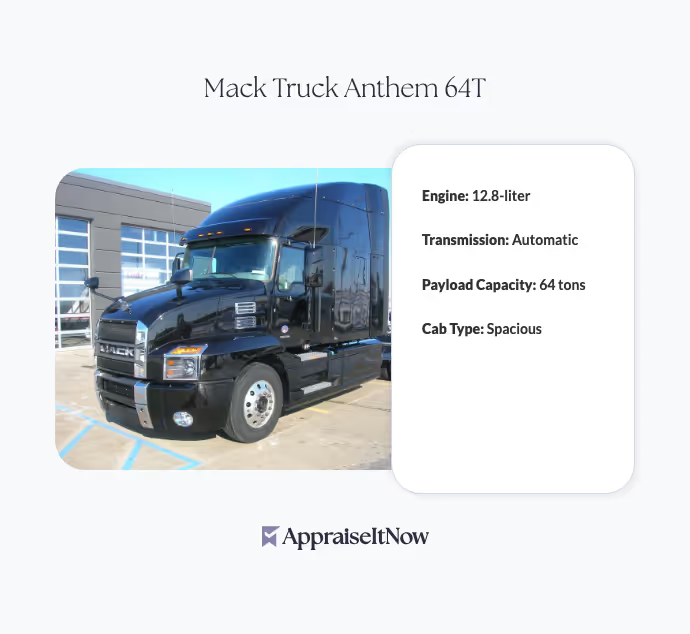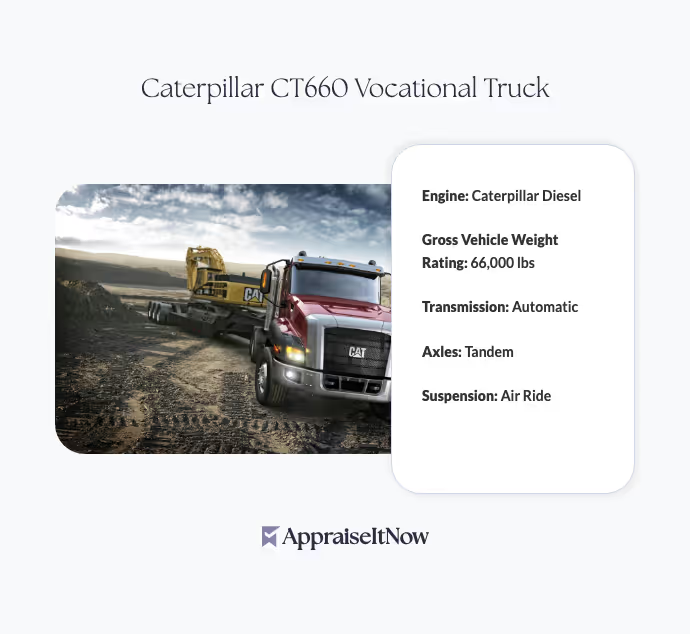<h1>How to Get Your Peterbilt 379 Extended Hood Appraised</h1>
<p>The Peterbilt 379 Extended Hood stands as a legendary icon in the heavy-duty trucking industry, commanding market values between <strong>$50,000 and $80,000</strong> depending on condition, year, and mileage. Whether you're buying, selling, or insuring this classic workhorse, understanding how to obtain an accurate professional appraisal ensures you make confident financial decisions backed by solid market data.</p>
<h2>Understanding Your Peterbilt 379 Extended Hood's Value</h2>
<p>The 379 Extended Hood's value stems from its legendary durability, proven reliability, and enduring appeal among long-haul truckers and fleet operators worldwide. First introduced in 1987, this commercial truck quickly became the industry standard, establishing a reputation that persists decades later. The extended hood design provides additional storage capacity and improved aerodynamics—critical features for the demanding long-haul applications that define modern trucking.</p>
<p>When you ask "How much is a 379 Peterbilt worth?" the answer depends heavily on production year, engine specification, and current condition. A 1994 Peterbilt 379 typically commands different pricing than a 2000 model, reflecting both technological improvements and remaining useful lifespan. Professional appraisers account for these year-specific factors when determining fair market value for insurance, sale, or financing purposes.</p>
<div class="callout tip"><p><strong>Market Insight</strong></p>
<p>Extended hood 379s with documented maintenance records and lower-mileage histories often command 15-25% premiums over comparable vehicles with incomplete service documentation.</p></div>
<h2>Key Factors Affecting Your 379's Appraisal Value</h2>
<p>Your Peterbilt 379's specific worth depends on multiple factors that experienced appraisers evaluate systematically. Understanding these elements helps you prepare documentation that supports your vehicle's market position and maximizes its valuation accuracy.</p>
<p>The iconic chrome front grille, spacious 72-inch sleeper cab, and renowned fuel efficiency distinguish the 379 from competing models. These design elements, combined with the truck's sturdy steel frame and reliable mechanical components, create the foundation for consistent value retention across market cycles. When comparing the Peterbilt 379 against other extended hood trucks, its durability and long-term operational cost advantages justify premium pricing in today's commercial vehicle market.</p>
<p>Engine configuration significantly influences valuation. Different powerplant options—ranging from earlier Cummins N14 engines to more modern specifications—carry distinct market premiums or discounts. Transmission type, whether manual or automated, also affects both operational appeal and resale value among professional drivers seeking specific performance characteristics for their intended applications.</p>
<h2>The Extended Hood: Design Value and Practical Benefits</h2>
<p>The 379's extended hood design represents more than aesthetic preference—it fundamentally improves the vehicle's operational efficiency and market appeal. The longer hood accommodates larger engines, provides superior weight distribution, and offers strategic storage compartments valued by owner-operators managing long-haul routes. These practical advantages translate directly into stronger market demand and more resilient resale values compared to conventional cab-forward designs.</p>
<p>When evaluating your truck, appraisers measure how the extended hood configuration maintains structural integrity and supports the vehicle's legendary reliability reputation. Customization options and aftermarket modifications to the hood area significantly impact appraisal outcomes—original factory specifications typically outvalue heavily modified examples, much like how collector vehicle appraisals favor authenticity in <a href="/types/automobile">automobile</a> and <a href="/blog/appraising-vintage-and-collectible-cars-determining-their-true-worth">classic car</a> evaluations.</p>
<div class="callout note"><p><strong>Design Consideration</strong></p>
<p>Original factory paint and unmolested extended hood components preserve maximum appraisal value, whereas custom modifications may narrow your potential buyer pool despite personal investment.</p></div>
<h2>Production Years and Market Positioning</h2>
<p>Understanding when your 379 was built provides context for its valuation tier. The model's production history spans decades, with different periods introducing mechanical and safety improvements that affect market positioning. A 1994 Peterbilt 379 reflects 1990s engineering standards, while a 2000 model incorporates late-decade technology advances that commercial fleets increasingly expect in pre-owned purchases.</p>
<p>Did Peterbilt stop making the 379? The model enjoyed an extraordinarily long production run, cementing its status as the most sought-after Peterbilt among professional drivers. This extended manufacturing window created diverse vintage options for buyers seeking specific model-year combinations of reliability, cost-effectiveness, and operational capability. Professional appraisers understand these year-specific nuances and apply appropriate market adjustments during valuation assessment.</p>
<h2>Condition Assessment and Mechanical Evaluation</h2>
<p>Your 379's physical condition directly determines where your appraisal falls within the $50,000–$80,000 range. Professional appraisals involving <a href="/blog/understanding-the-value-of-heavy-machinery-appraisal">heavy-machinery</a> and commercial <a href="/types/truck">truck</a> assets require detailed mechanical inspection documenting engine condition, transmission performance, brake system integrity, and frame structural soundness. Rust, corrosion, or accident history significantly reduces valuation, whereas well-maintained examples command premium pricing.</p>
<p>Interior condition matters substantially for driver-operated vehicles. Sleeper cab upholstery, dashboard electronics functionality, HVAC system performance, and overall cab cleanliness influence purchasing decisions among professional truckers who spend 60+ hours weekly in these environments. Appraisers document these comfort and convenience factors knowing they directly impact driver satisfaction and retention for fleet operations.</p>
<h2>Mileage, Hours, and Usage History</h2>
<p>Similar to assessing <a href="/types/recreational-vehicle">recreational vehicles</a>, understanding your 379's operational history proves critical for accurate valuation. Commercial trucks accumulate usage differently than consumer vehicles—industry professionals evaluate total engine hours, brake cycles, and specific hauling applications rather than simple odometer readings. A 379 with high mileage but light-duty local work may command higher value than a lower-mileage example that sustained heavy cross-country hauling and mountainous terrain.</p>
<p>Professional appraisers request comprehensive maintenance records documenting major service intervals, engine overhauls, transmission rebuilds, and component replacements. These records validate that your 379 received appropriate care, justifying premium valuations and providing confidence to potential buyers. Conversely, incomplete documentation raises concerns about deferred maintenance, typically resulting in appraisal reductions of 10-20% even on mechanically sound examples.</p>
<div class="callout tip"><p><strong>Documentation Advantage</strong></p>
<p>Comprehensive maintenance logs and service records increase appraisal credibility and buyer confidence, often justifying price premiums that exceed documentation costs.</p></div>
<h2>Market Demand and Driver Preferences</h2>
<p>Do Peterbilts hold their value? The 379's consistent demand among professional truckers demonstrates strong value retention throughout its production years. Long-haul truckers specifically prefer the 379's combination of comfort, fuel efficiency, and proven durability. This established preference creates stable secondary market demand supporting valuations even as vehicles age and accumulate mileage.</p>
<p>What truck drivers make $300,000 a year? Owner-operators commanding premium freight rates typically prioritize vehicles like the 379 that optimize fuel efficiency, minimize downtime, and provide comfortable working environments. These high-earning professionals represent the upper-tier buyer segment for quality 379 extended hoods, directly supporting strong market values for well-maintained examples suitable for professional-grade applications.</p>
<p>The question "Is the 379 still a reliable truck today?" receives consistent affirmation from professional drivers and fleet managers who continue operating 379s decades after manufacture. This proven reliability justifies investment in quality pre-owned examples, creating competitive bidding scenarios that support strong market valuations during appraisal assessment.</p>
<h2>Customization, Modifications, and Aftermarket Equipment</h2>
<p>Professional-grade 379s often feature specialized equipment reflecting specific trucking applications—refrigerated units, specialized cargo handling systems, or advanced telematics installations. These modifications can enhance or diminish appraisal value depending on quality, market applicability, and integration with factory systems. Original factory specifications typically command higher valuations than heavily customized examples, though well-executed professional modifications supporting specific applications may preserve or enhance value.</p>
<p>Appraisers evaluate aftermarket components carefully, distinguishing between value-adding upgrades (high-quality brake systems, engine efficiency enhancements) and cosmetic modifications that narrow buyer appeal. Understanding these distinctions helps you position modifications accurately during professional appraisal processes, ensuring appropriate valuation recognition for genuine improvements while avoiding overvaluation of subjective customization.</p>
<h2>Insurance and Financing Implications</h2>
<p>Professional appraisals serve critical functions beyond simple valuation—they establish documented market values necessary for insurance coverage, financing approvals, and estate settlement. When securing appraisals for <a href="/types/business-assets">commercial assets</a>, specify whether valuations support full replacement coverage, agreed-value policies, or fair market assessment for transaction purposes. Different applications require distinct appraisal methodologies and documentation standards.</p>
<p>Lenders evaluating financing requests for 379 purchases rely on professional appraisals establishing collateral value with documented accuracy. Insurance companies requiring replacement cost valuations depend on certified appraisals reflecting current market conditions rather than historical cost estimates. Professional appraisers understand these varied requirements and structure their assessments accordingly, ensuring your documentation meets specific use-case requirements.</p>
<h2>Regional Market Variations</h2>
<p>Peterbilt 379 Extended Hood values fluctuate regionally based on local trucking industry activity, fuel costs, freight rate environments, and competing vehicle availability. Regions with active long-haul trucking industries typically support stronger valuations than areas dominated by short-haul or local delivery operations. Professional appraisers familiar with regional market conditions apply appropriate geographic adjustments, ensuring valuations reflect local competitive dynamics rather than national averages.</p>
<p>Climate considerations also influence regional values. Areas experiencing harsh winters may see reduced demand for extended hood designs lacking specific cold-weather configurations, while fuel-cost-sensitive regions emphasize the 379's legendary fuel efficiency as a major value driver. These regional nuances require appraisers with local market expertise, particularly important when preparing valuations for sale across state lines or multi-regional fleet operations.</p>
<h2>Comparative Market Analysis in Professional Appraisals</h2>
<p>How to look up the value of a semi truck? Professional appraisers employ systematic comparative market analysis evaluating recent sales, active listings, and dealer valuations for comparable 379 models. This methodology mirrors approaches used for <a href="/blog/a-simple-guide-to-automobile-appraisal-services">automobile appraisals</a>, establishing fair market value through data-driven analysis rather than subjective estimation. Certified appraisers access specialized commercial vehicle databases documenting transactions, pricing trends, and market activity specific to heavy-duty trucks.</p>
<p>When seeking your own preliminary valuation research, investigate recent sales prices for 379s matching your model year, engine specification, and general condition range. Professional auction results, dealer inventories, and owner-operator forums provide market context, though certified appraisals provide legally defensible valuations appropriate for formal transactions and insurance purposes.</p>
<h2>Why Professional Appraisals Matter</h2>
<p>Is a 379 Peterbilt a good investment? Professional appraisals provide definitive answers by evaluating your specific 379 against documented market data, recent comparable sales, and current demand indicators. Rather than relying on estimates or informal valuations, certified appraisals deliver USPAP-compliant documentation accepted by financial institutions, insurance companies, and legal proceedings. AppraiseItNow connects you with credentialed experts across the U.S. qualified in <a href="/blog/the-basics-of-heavy-machinery-appraisal">heavy-machinery appraisal</a>, commercial vehicle valuation, and <a href="/types/semi-truck">semi-truck</a> assessment.</p>
<p>Professional appraisers recognize the 379's place in trucking history as the backbone of American long-haul operations. This institutional knowledge, combined with data-driven methodologies, ensures your appraisal reflects genuine market value rather than outdated estimates or emotional attachments to vehicle significance. Whether preparing for sale, purchase, financing, insurance, or estate purposes, professional appraisals provide the credible documentation supporting confident financial decisions.</p>
<div class="callout note"><p><strong>Key Takeaway</strong></p>
<p>A certified appraisal of your Peterbilt 379 Extended Hood delivers market-backed valuation documentation establishing accurate worth for buying, selling, financing, or insurance purposes. Professional expertise ensures your classic commercial truck receives appropriate valuation recognition, providing confidence that your financial decisions rest on solid, defensible market analysis rather than casual estimation.</p></div>
















